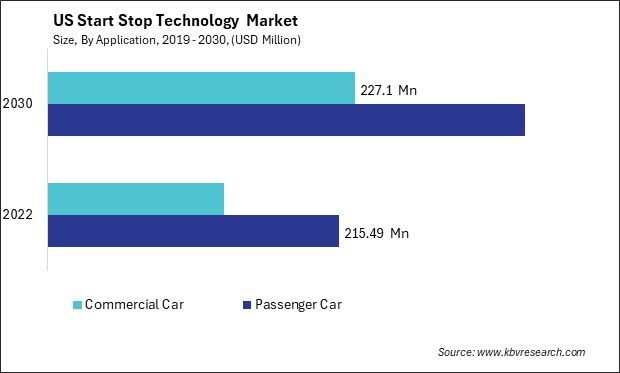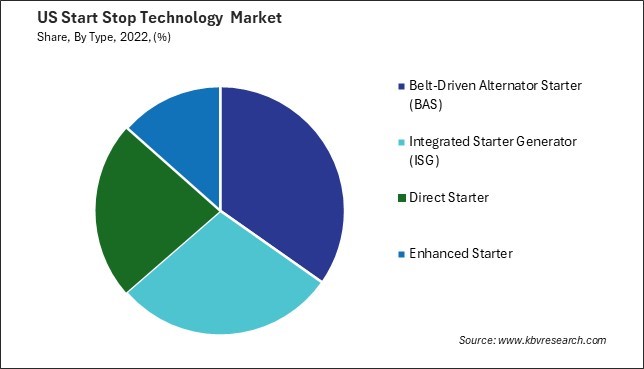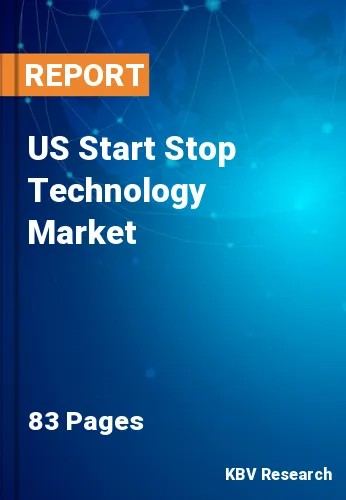The United States (US) Start Stop Technology Market size is expected to reach $580.03 Million by 2030, rising at a market growth of 6.4% CAGR during the forecast period.
The start stop technology market in the United States has witnessed substantial growth in recent years, driven by increasing awareness about environmental sustainability and the need for fuel efficiency in vehicles. One of the key factors driving the adoption of start stop technology in the U.S. is stringent government regulations aimed at reducing vehicle emissions and improving fuel economy standards. Regulatory bodies such as the Environmental Protection Agency (EPA) and the National Highway Traffic Safety Administration (NHTSA) have implemented fuel efficiency standards that automakers must meet, leading them to incorporate start-stop systems into their vehicles to comply with these regulations.

Another factor contributing to the growth of the start stop technology market is the increasing availability of hybrid and electric vehicles (EVs) in the U.S. While start stop systems are typically found in conventional internal combustion engine (ICE) vehicles, they are also being integrated into hybrid and plug-in hybrid electric vehicles to enhance their fuel efficiency and reduce emissions. As the adoption of hybrid and electric vehicles continues to rise, the demand for start stop technology is expected to increase proportionally, further driving industry growth.
The COVID-19 pandemic has significantly impacted the automotive industry, including the start stop technology market in the U.S. The pandemic led to disruptions in global supply chains, manufacturing operations, and consumer demand, resulting in a temporary slowdown in vehicle production and sales. As a result, the adoption of start stop technology has been affected in the short term as automakers have faced challenges in meeting production targets and launching new vehicle models. However, the pandemic also highlighted the importance of sustainability and environmental conservation, leading to increased interest in fuel-efficient technologies such as start stop systems as consumers seek to reduce their carbon footprint and operating costs in the aftermath of the crisis.
The automotive industry in the United States has experienced significant expansion in adopting start stop technology in recent years, reflecting a broader trend toward enhancing vehicle fuel efficiency and reducing emissions. One key driving force behind the expansion of start stop technology market in the U.S. is increasingly stringent fuel efficiency and emissions regulations imposed by both federal and state governments. These regulations, aimed at reducing greenhouse gas emissions and dependence on fossil fuels, have prompted automakers to seek innovative solutions to improve the efficiency of internal combustion engines.
Furthermore, advancements in battery technology and electronic control systems have made it easier for automakers in the U.S. to integrate start stop technology into their vehicles without significant additional costs or engineering challenges. As a result, an increasing number of new vehicles across different segments, from compact cars to SUVs and pickup trucks, now come equipped with start stop systems as standard or optional features.
According to Select US, in 2020, international automakers produced 5 million vehicles in the United States. This included the export of 1.4 million new light vehicles and 108,754 medium and heavy trucks, amounting to a total value exceeding $52 billion. Additionally, automotive parts valued at $66.7 billion were exported to over 200 industries worldwide. As consumer and regulatory demands for more environmentally friendly vehicles continue to grow, the adoption of start stop technology is expected to surge, further propelling the evolution and expansion of the automotive industry within the U.S.
Furthermore, rising fuel prices have also contributed to the popularity of start stop technology among U.S. consumers. By reducing fuel consumption during idle periods, start stop systems help drivers in the U.S. save money on fuel costs over time, making them a desirable feature for many consumers. Therefore, driven by stringent regulations and rising fuel prices, the adoption of start stop technology in the U.S. automotive industry.
The start stop technology market in the United States has experienced significant growth driven by rising consumer demand for more fuel-efficient vehicles. One of the primary drivers behind the increasing demand for start stop technology is the growing awareness of environmental issues and the need to reduce greenhouse gas emissions. With rising concerns over climate change and air pollution, U.S. consumers are actively seeking vehicles that offer better fuel efficiency and lower emissions. Start-stop technology presents a relatively simple and cost-effective solution to improve fuel economy and reduce tailpipe emissions, making it an attractive feature for eco-conscious buyers.
Furthermore, automakers in the U.S. are increasingly integrating start stop technology into their vehicle lineups to meet Corporate Average Fuel Economy (CAFE) standards set by regulatory authorities. By improving the overall fuel efficiency of their fleets, automakers ensure compliance with regulations while also appealing to consumers who prioritize environmental sustainability and cost savings.
Moreover, automakers are actively integrating start-stop technology into their vehicle lineups to meet American's preferences and regulatory requirements. As a result, the availability of vehicles equipped with this feature has expanded across different segments and price points, making it more accessible to a broader range of consumers. Thus, the increasing demand for start stop technology in the United States is driven by consumer preferences for fuel efficiency and automakers' efforts to meet regulatory standards.

In the United States, the automotive industry has witnessed significant growth in adopting start stop technology, driven by the need for more fuel-efficient vehicles and stringent emission regulations. One of the key players in the U.S. start stop technology market is Johnson Controls International plc, a multinational conglomerate specializing in automotive components and systems. Johnson Controls offers start-stop battery systems to support the increased demand for batteries in vehicles equipped with start-stop technology. These batteries feature advanced technologies, such as enhanced cycling capability and improved durability, to ensure reliable performance and longevity in start stop applications.
Another major contributor to the U.S. start stop technology market is Continental AG, a leading automotive supplier known for its expertise in powertrain components and systems. Continental offers a range of start-stop solutions, including integrated starter-generators and enhanced battery management systems, designed to integrate with existing vehicle architectures seamlessly. These solutions enable automakers to implement start-stop technology across various vehicle platforms while meeting performance, efficiency, and durability requirements.
Furthermore, Delphi Technologies, now part of BorgWarner Inc., is a leading supplier of advanced propulsion technologies for the automotive industry. Delphi Technologies offers start-stop solutions that leverage its expertise in power electronics, energy storage systems, and engine management technologies. These solutions enable automakers to implement start-stop functionality in their vehicles while maintaining performance and drivability, thus addressing consumer demand for more fuel-efficient and environmentally friendly vehicles in the U.S.
Additionally, Valeo SA, a global automotive supplier specializing in electrification and connected mobility solutions, is actively involved in the U.S. start stop technology market. Valeo offers start-stop systems that integrate seamlessly with vehicle powertrains, providing automakers with a cost-effective and efficient means of improving fuel economy and reducing emissions. These systems leverage Valeo's expertise in powertrain electrification and control technologies to deliver optimized performance and reliability in various driving conditions encountered in the U.S. As consumer awareness of the benefits of start stop technology continues to increase, these companies are poised to play a crucial role in shaping the future of the automotive industry in the United States.
By Application
By Type
Our team of dedicated experts can provide you with attractive expansion opportunities for your business.

